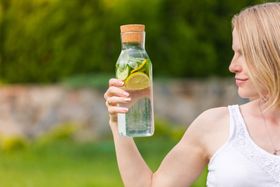Can Drinking Water Help With Arthritis? Discover the Benefits
Learn how staying hydrated can significantly improve your quality of life with arthritis.
Updated February 5, 2025

If you or a loved one are living with arthritis, you know all too well the debilitating impact it can have on daily life. The pain, stiffness, and inflammation can make even the simplest tasks feel like a monumental struggle.
While there's no magic cure, a simple yet often overlooked solution could provide relief—hydration. Explore how it improves joint function, reduces inflammation, and more effectively manages arthritis symptoms.
» Discover how to elevate your hydration and manage arthritis symptoms
What is Arthritis?
Arthritis is an umbrella term for conditions that cause joint pain and inflammation. It affects millions worldwide and can significantly impact quality of life. While there are many types of arthritis, they all share a common factor—cartilage damage. [1]
When cartilage—the protective tissue cushioning the ends of your bones—breaks down, it can cause pain, stiffness, and swelling in the affected joints. Several factors can contribute to cartilage damage, including:
- Osteoarthritis: This is the most common type, caused by wear and tear on joints over time.
- Rheumatoid Arthritis: An autoimmune disease where the body's immune system attacks its own tissues, including cartilage.
- Gout: A type of arthritis caused by a buildup of uric acid crystals in the joints.
- Infectious Arthritis: Occurs when bacteria or viruses infect a joint.
- Injury: Joint damage from an injury can lead to post-traumatic arthritis.
Understanding the underlying causes of arthritis is crucial in recognizing the potential benefits of proper hydration.
» Understand how food and water impact your health
The Link Between Water and Arthritis
Since cartilage is made of approximately 80% water, proper hydration is crucial in maintaining its health and function. [2] This connection between water and arthritis has many benefits:
Cartilage Protection: Picture your cartilage as a sponge—it requires constant saturation to maintain its shock-absorbing properties. A well-hydrated body can better support joint cartilage, potentially slowing the degenerative process associated with arthritis. [3]
Reduced Inflammation: Sufficient water intake aids in eliminating toxins that can cause inflammation. This is particularly beneficial for inflammatory arthritis types, such as rheumatoid and psoriatic arthritis. As systemic inflammation decreases, you may notice reduced joint pain and swelling.
Improved Joint Lubrication: Adequate fluid consumption boosts the fluid dynamics within your joints, minimizing friction between cartilage and bones. The result? Decreased pain, increased range of motion, and enhanced overall mobility—making daily activities and staying active much easier.
Pain Reduction: Regular water intake helps expel toxins and combat inflammation, often leading to less pain, especially during arthritis flare-ups. Envision your joints feeling less stiff and achy, allowing for easier movement.
Weight Management: Proper fluid intake can boost metabolism, curb appetite, and optimize joint function. This makes exercise more manageable and helps maintain a healthy weight, ultimately reducing pressure on your joints.
While research continues to uncover the full extent of its benefits, staying hydrated is increasingly recognized as a critical factor in managing arthritis.
» Check out the best types of water for cellular hydration
Tips for Staying Hydrated
To reap the benefits of hydration for arthritis management, consider implementing the following strategies:
- Choose Clean Water: Tap water can contain contaminants or additives that may worsen inflammation. Opt for clean, filtered water to avoid introducing potentially harmful substances.
- Personalize Your Intake: Your hydration needs may vary based on age, activity level, and overall health. Aim for the general recommendation of 48–96 ounces daily, but consult your doctor for personalized advice.
- Start Your Day Right: Begin each morning with a tall glass of water to kickstart your day and take any necessary supplements.
- Carry a Reusable Water Bottle: Always keep a reusable water bottle filled with clean, filtered water by your side. Having water readily available will naturally encourage you to sip more frequently throughout the day, helping you reach your goals.
- Flavor Your Water: If plain water is unappealing, try flavoring it with fruit, cucumber, citrus, or 100% no-sugar-added fruit juice.
- Find an Accountability Partner: Many share the goal of staying hydrated, so finding an accountability partner may be easier than you think. To motivate each other, set up regular check-ins with friends, family members, or even a digital community.
Remember to prioritize hydration before, during, and after physical activity and in hot weather to replenish fluids lost through sweat. Avoid drinking too much water close to bedtime, which may disrupt sleep.
» Check out the best ways to recover from dehydration
Mineral Drops: A Solution for Enhanced Hydration
In addition to drinking plain water, consider incorporating mineral drops into your daily routine. These concentrated supplements provide essential minerals that may be lacking in regular water, enhancing your body's ability to absorb and retain fluids.
For people with arthritis, this has several potential benefits:
- Improved Mineral Balance: Arthritis is sometimes associated with mineral imbalances or deficiencies. Adding these drops to your water can help you get a broad spectrum of essential minerals.
- Enhanced Hydration: Electrolytes in mineral drops can improve the body's ability to absorb and retain water, potentially leading to more efficient hydration.
- Reduced Inflammation: Some minerals, such as magnesium and zinc, have anti-inflammatory properties. Research has shown this may help alleviate arthritis symptoms when consumed regularly. [4]
- Better Taste: Mineral drops can improve the taste of water, making it more appealing and encouraging increased consumption.
- Customizable Intake: You can adjust the concentration of minerals in your water based on your individual needs and preferences.
Consult with your healthcare provider before adding mineral supplements to your routine, especially if you have any underlying health conditions or are taking medications.
» Find out the best ways to tackle a mineral deficiency
Beyond Hydration: A Comprehensive Approach
Remember that hydration is just one aspect of arthritis treatment. A comprehensive approach that includes a balanced diet, regular exercise, stress management, and appropriate medical care is essential for effectively managing symptoms.
By making hydration a priority and considering options like mineral drops, you can take an active role in supporting your joint health and alleviating some of the challenges associated with arthritis. Drink enough water, stay healthy, and keep progressing on your journey to better joint health.
» Boost your hydration and fight arthritis with mineral drops
References
[1] S. Senthelal, J. Li, S. Ardeshirzadeh, and M. A. Thomas, “Arthritis,” StatPearls - NCBI Bookshelf, Jun. 20, 2023. https://www.ncbi.nlm.nih.gov/books/NBK518992/ Available: https://www.ncbi.nlm.nih.gov/books/NBK518992/
[2] J. M. Shiguetomi-Medina, J. L. Ramirez-Gl, H. Stødkilde-Jørgensen, and B. Møller-Madsen, “Systematized water content calculation in cartilage using T1-mapping MR estimations: design and validation of a mathematical model,” Journal of Orthopaedics and Traumatology, vol. 18, no. 3, pp. 217–220, Oct. 2016, doi: 10.1007/s10195-016-0433-8. Available https://www.ncbi.nlm.nih.gov/pmc/articles/PMC5585083/#:~:text=Up%20to%2080%20%25%20of%20cartilage,is%20collagen%20fibers%20and%20proteoglycans.
[3] A. J. S. Fox, A. Bedi, and S. A. Rodeo, “The basic science of articular cartilage: structure, composition, and function,” Sports Health a Multidisciplinary Approach, vol. 1, no. 6, pp. 461–468, Nov. 2009, doi: 10.1177/1941738109350438. Avaliable https://www.ncbi.nlm.nih.gov/pmc/articles/PMC3445147/
[4] “Vitamins and minerals for arthritis.” https://www.arthritis.org/health-wellness/treatment/complementary-therapies/supplements-and-vitamins/vitamin-and-mineral-guide-for-arthritis
FAQs
What is the fastest way to treat arthritis?
Arthritis management often requires a multi-faceted approach. While there's no quick fix, a combination of medications, physical therapy, weight management, and lifestyle modifications can significantly improve symptoms and quality of life.
What foods aggravate arthritis?
Certain foods can trigger arthritis flare-ups. Processed foods, red meat, refined carbohydrates, fried foods, dairy, nightshades, alcohol, caffeine, and gluten are common culprits.
Keeping a food diary and consulting with a healthcare professional can help you identify and manage your personal triggers.
What foods help arthritis pain go away?
A diet rich in anti-inflammatory foods can help alleviate arthritis symptoms. Incorporate omega-3 fatty acids from fatty fish, antioxidants from fruits and vegetables, whole grains, lean proteins, nuts, seeds, turmeric, and ginger into your diet.
How much water should you drink a day for arthritis?
The amount of water you should drink daily for arthritis depends on several factors, including your overall health, activity level, and climate.
While there's no one-size-fits-all recommendation, the general guideline is to aim for 8-10 glasses of water per day.
Disclaimer: The information published by Mayu Water is not a substitute for the expert knowledge, advice, and recommendations of trained professionals. We strongly recommend consulting with industry experts and primary or scientific sources before making any health, research-related, or other important decisions.













































